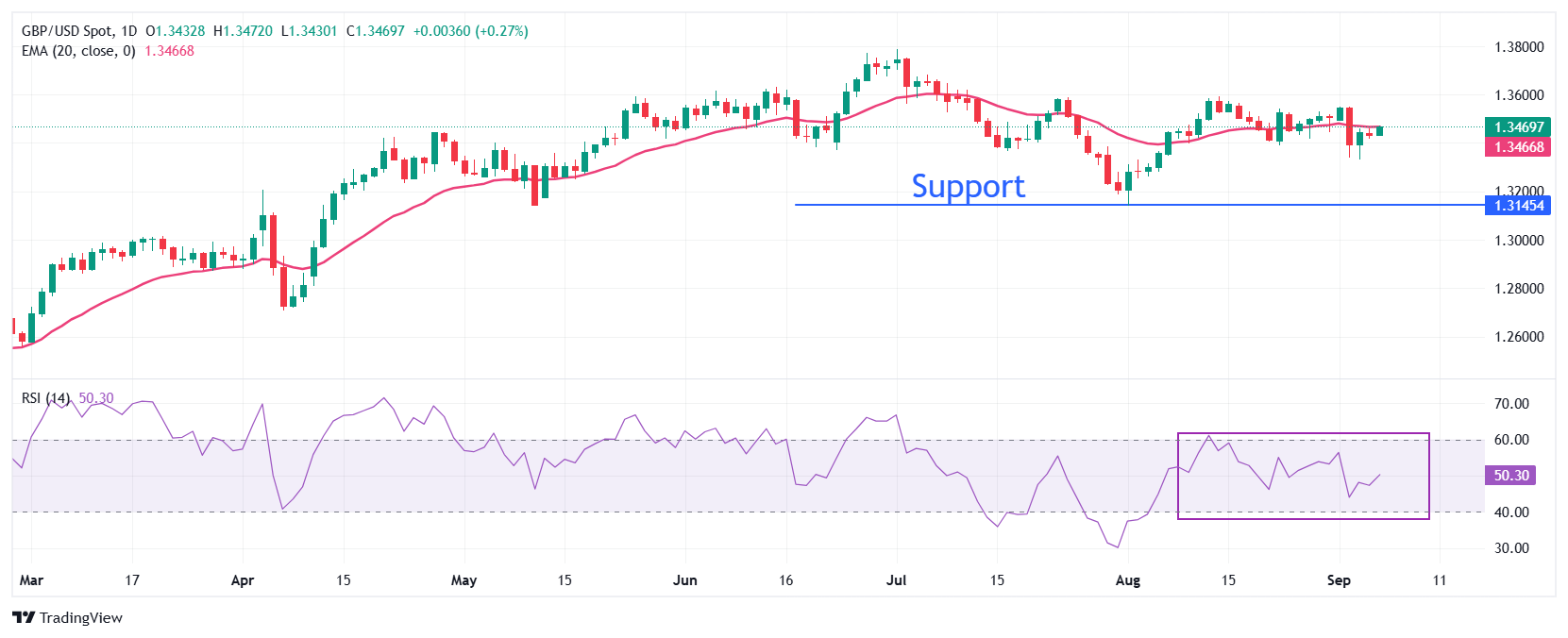Created
: 2025.09.05














![]() 2025.09.05 16:24
2025.09.05 16:24
The Pound Sterling (GBP) attracts bids against its peers on Friday after the release of the upbeat United Kingdom (UK) Retail Sales data for July. The Office for National Statistics (ONS) reported that Retail Sales, a key measure of consumer spending, surprisingly grew at a faster pace of 0.6% on a monthly basis, compared to the 0.2% expected by economists. In June, the consumer spending measure rose 0.3%, revised lower from 0.9%.
On an annualized basis, the Retail Sales data has risen by 1.1%, missing estimates of 1.3%. However, the pace of growth was faster than the 0.9% increase seen in June, revised lower from 1.7%.
Signs of rising UK retal sales demonstrate strong consumer demand, which often leads to the maintenance of a restrictive monetary policy stance by the Bank of England (BoE) as it could lead to higher consumer inflation.
Meanwhile, the BoE is expected to maintain interest rates at their current level of 4% in the policy meeting this month, as inflation in the UK is proving to be persistent.
BoE Governor Andrew Bailey also expressed uncertainty over the pace of interest rate cuts on Wednesday, in his speech before the House of Commons' Treasury Committee. "I think path for rates will continue to be downwards, but there is considerably more doubt on how fast we can cut rates," Bailey said.

The Pound Sterling rises to near 1.3470 against the US Dollar on Friday. However, the near-term trend of the GBP/USD pair is sideways as it trades close to the 20-day Exponential Moving Average (EMA), which is around 1.3470.
The 14-day Relative Strength Index (RSI) oscillates inside the 40.00-60.00 range, indicating a sideways trend.
Looking down, the August 1 low of 1.3140 will act as a key support zone. On the upside, the August 14 high near 1.3600 will act as a key barrier.
The Pound Sterling (GBP) is the oldest currency in the world (886 AD) and the official currency of the United Kingdom. It is the fourth most traded unit for foreign exchange (FX) in the world, accounting for 12% of all transactions, averaging $630 billion a day, according to 2022 data. Its key trading pairs are GBP/USD, also known as 'Cable', which accounts for 11% of FX, GBP/JPY, or the 'Dragon' as it is known by traders (3%), and EUR/GBP (2%). The Pound Sterling is issued by the Bank of England (BoE).
The single most important factor influencing the value of the Pound Sterling is monetary policy decided by the Bank of England. The BoE bases its decisions on whether it has achieved its primary goal of "price stability" - a steady inflation rate of around 2%. Its primary tool for achieving this is the adjustment of interest rates. When inflation is too high, the BoE will try to rein it in by raising interest rates, making it more expensive for people and businesses to access credit. This is generally positive for GBP, as higher interest rates make the UK a more attractive place for global investors to park their money. When inflation falls too low it is a sign economic growth is slowing. In this scenario, the BoE will consider lowering interest rates to cheapen credit so businesses will borrow more to invest in growth-generating projects.
Data releases gauge the health of the economy and can impact the value of the Pound Sterling. Indicators such as GDP, Manufacturing and Services PMIs, and employment can all influence the direction of the GBP. A strong economy is good for Sterling. Not only does it attract more foreign investment but it may encourage the BoE to put up interest rates, which will directly strengthen GBP. Otherwise, if economic data is weak, the Pound Sterling is likely to fall.
Another significant data release for the Pound Sterling is the Trade Balance. This indicator measures the difference between what a country earns from its exports and what it spends on imports over a given period. If a country produces highly sought-after exports, its currency will benefit purely from the extra demand created from foreign buyers seeking to purchase these goods. Therefore, a positive net Trade Balance strengthens a currency and vice versa for a negative balance.
![]()
Created
: 2025.09.05
![]()
Last updated
: 2025.09.05

FXStreet is a forex information website, delivering market analysis and news articles 24/7.
It features a number of articles contributed by well-known analysts, in addition to the ones by its editorial team.
Founded in 2000 by Francesc Riverola, a Spanish economist, it has grown to become a world-renowned information website.
We hope you find this article useful. Any comments or suggestions will be greatly appreciated.
We are also looking for writers with extensive experience in forex and crypto to join us.
please contact us at [email protected].
Disclaimer:
All information and content provided on this website is provided for informational purposes only and is not intended to solicit any investment. Although all efforts are made in order to ensure that the information is correct, no guarantee is provided for the accuracy of any content on this website. Any decision made shall be the responsibility of the investor and Myforex does not take any responsibility whatsoever regarding the use of any information provided herein.
The content provided on this website belongs to Myforex and, where stated, the relevant licensors. All rights are reserved by Myforex and the relevant licensors, and no content of this website, whether in full or in part, shall be copied or displayed elsewhere without the explicit written permission of the relevant copyright holder. If you wish to use any part of the content provided on this website, please ensure that you contact Myforex.
Myforex uses cookies to improve the convenience and functionality of this website. This website may include cookies not only by us but also by third parties (advertisers, log analysts, etc.) for the purpose of tracking the activities of users. Cookie policy